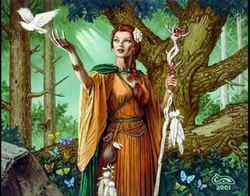Demeter: Difference between revisions
No edit summary |
No edit summary |
||
| Line 1: | Line 1: | ||
Demeter is the daughter of the Titans Cronus and Rhea. These are also, 'technically', the parents of Zeus and hence Demeter is the sister of Zeus. She is a [[Divinity Hierarchy|Lesser God]] in [[the Twelve]]: the pantheon of Gods in the 'official' religion of [[the Merebian Empire]].[[Image:Demeter.png|thumb|250px|left|A typical representation of Demeter © 2001 Unknown]] | Demeter is the daughter of the Titans Cronus and Rhea. These are also, 'technically', the parents of Zeus and hence Demeter is the sister of Zeus. She is a [[Divinity Hierarchy|Lesser God]] in [[the Twelve]]: the pantheon of Gods in the 'official' religion of [[the Merebian Empire]].[[Image:Demeter.png|thumb|250px|left|A typical representation of Demeter © 2001 Unknown]] | ||
==Description== | |||
Demeter is usually depicted as handsome woman in her mid to late 30s with tanned skin and dark hair. She wear robes adorned with flowers, particularly poppies. Her symbol is, therefore, a poppy on a white background. | |||
==Sphere of Influence== | |||
Often referred to as 'The Bringer', Demeter is the Goddess of Summer, Harvests, and of Nature. She is, however, the personification of Nature which has been 'tamed' by civilisation, as opposed to 'Pan' who represents nature in it's 'wild', uncivilised state. Demeter is widely accredited with teaching mankind how to grow and cultivate crops and the seasons are reflections of her mood (see later). | Often referred to as 'The Bringer', Demeter is the Goddess of Summer, Harvests, and of Nature. She is, however, the personification of Nature which has been 'tamed' by civilisation, as opposed to 'Pan' who represents nature in it's 'wild', uncivilised state. Demeter is widely accredited with teaching mankind how to grow and cultivate crops and the seasons are reflections of her mood (see later). | ||
==Relationships== | |||
Of all the deities of the Twelve she is closest to her brother Dionysus, and the Festival of Dionysus (which occurs immediately after the end of the harvest in the [[Calendar]]) is a testament to that relationship. | Of all the deities of the Twelve she is closest to her brother Dionysus, and the Festival of Dionysus (which occurs immediately after the end of the harvest in the [[Calendar]]) is a testament to that relationship. | ||
| Line 13: | Line 18: | ||
Demeter's mood and physical state can also cause crops to fail to grow at other times of the year. When Demeter was raped by Poseidon she retreated from the mortal realm to recover and it is said that a great famine descended upon Oberon which lasted for a generation. | Demeter's mood and physical state can also cause crops to fail to grow at other times of the year. When Demeter was raped by Poseidon she retreated from the mortal realm to recover and it is said that a great famine descended upon Oberon which lasted for a generation. | ||
==Clerics== | ==Clerics== | ||
Revision as of 19:46, 16 August 2019
Demeter is the daughter of the Titans Cronus and Rhea. These are also, 'technically', the parents of Zeus and hence Demeter is the sister of Zeus. She is a Lesser God in the Twelve: the pantheon of Gods in the 'official' religion of the Merebian Empire.
Description
Demeter is usually depicted as handsome woman in her mid to late 30s with tanned skin and dark hair. She wear robes adorned with flowers, particularly poppies. Her symbol is, therefore, a poppy on a white background.
Sphere of Influence
Often referred to as 'The Bringer', Demeter is the Goddess of Summer, Harvests, and of Nature. She is, however, the personification of Nature which has been 'tamed' by civilisation, as opposed to 'Pan' who represents nature in it's 'wild', uncivilised state. Demeter is widely accredited with teaching mankind how to grow and cultivate crops and the seasons are reflections of her mood (see later).
Relationships
Of all the deities of the Twelve she is closest to her brother Dionysus, and the Festival of Dionysus (which occurs immediately after the end of the harvest in the Calendar) is a testament to that relationship.
Demeter is said to have sired a daughter with her brother, Zeus, called Persephone (try not to think about it) who was later abducted by Hades and taken to the Underworld. Persephone was released but must return to the Underworld for three months of each year. During this time her mother, Demeter, permits no crops to grow and a coldness falls upon the land. This is, of course, why we have Winter but is known by many as "Demeter's Sorrow".
Demeter's mood and physical state can also cause crops to fail to grow at other times of the year. When Demeter was raped by Poseidon she retreated from the mortal realm to recover and it is said that a great famine descended upon Oberon which lasted for a generation.
Clerics
Her Clerics are considered to be the 'militant' arm of the faith - they follow either the 'Nature' or 'Life' domains but they are also very much part of how the Empire maintains its power structure.

